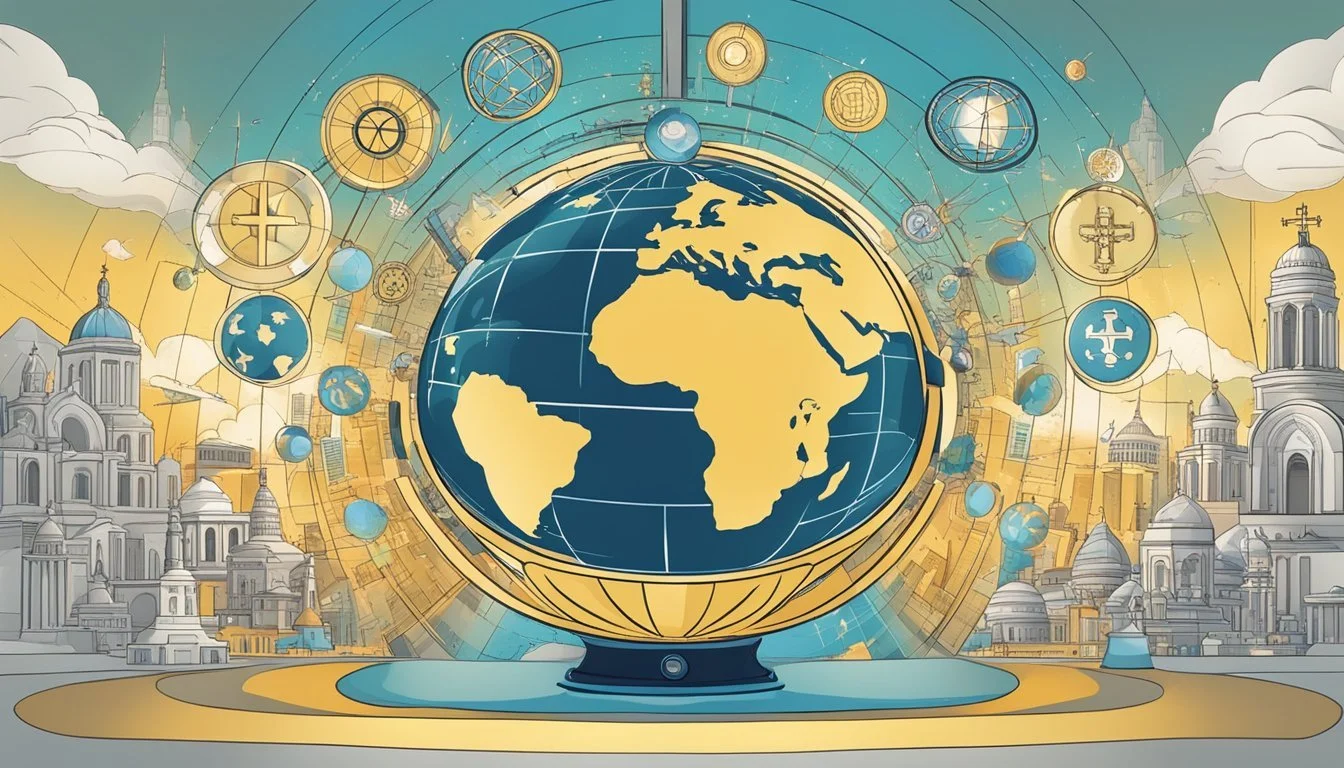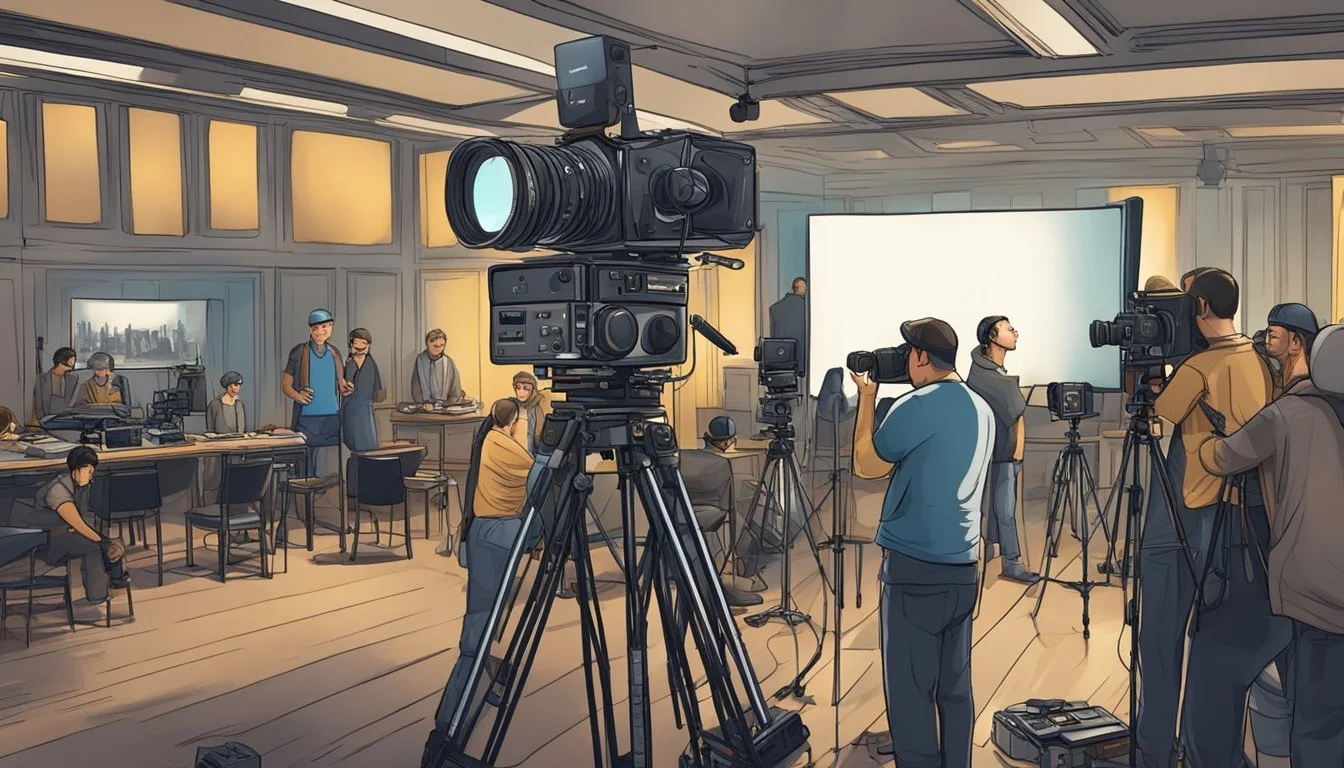Zeitgeist: The Viral Documentary That Shattered Reality and Divided the World
"Zeitgeist: The Movie" burst onto the internet scene in 2007, captivating millions with its provocative blend of conspiracy theories and cultural critique. Directed by Peter Joseph, this controversial documentary quickly went viral on platforms like Google Video and YouTube. The film explores topics ranging from religion and 9/11 to the global financial system, challenging viewers' understanding of societal structures and beliefs.
The documentary's impact extends beyond its initial release, spawning sequels and sparking heated debates. It combines archival footage, animations, and narration to present its arguments, drawing on a mix of historical facts and speculative claims. While some praise "Zeitgeist" for encouraging critical thinking, others criticize its reliance on unsubstantiated theories.
"Zeitgeist" has become a cultural touchstone, influencing discussions on alternative media and conspiracy culture. Its popularity reflects a growing public interest in questioning official narratives and exploring unconventional perspectives on world events. The film's legacy continues to resonate, inspiring both fervent supporters and vocal critics in equal measure.
Origins of the Zeitgeist Film Series
The Zeitgeist film series began with a single documentary that sparked widespread interest and debate. Its success led to the creation of two sequels, expanding the project into a full trilogy.
Development of Zeitgeist: The Movie
Zeitgeist: The Movie debuted in 2007 as an online documentary. Created by Peter Joseph, the film presented controversial theories on religion, politics, and economics. It gained significant attention through internet distribution and free screenings.
The documentary covered three main topics: religious myths, the September 11 attacks, and the Federal Reserve System. Joseph combined existing conspiracy theories with his own research and interpretations. He used a mix of archival footage, animations, and narration to convey his ideas.
Despite criticism from skeptics and experts in various fields, the film resonated with many viewers. Its provocative claims and slick production values contributed to its viral spread online.
Expansion into a Series
The unexpected popularity of Zeitgeist: The Movie led Peter Joseph to create two sequels. Zeitgeist: Addendum was released in 2008, focusing more on economic issues and proposing alternative social systems.
Zeitgeist: Moving Forward, the final installment, came out in 2011. This film expanded on the previous themes and introduced new ideas about human behavior and sustainable living.
The trilogy's success spawned the Zeitgeist Movement, a global sustainability advocacy group. Each film built upon the ideas of its predecessor, creating a comprehensive critique of modern society and offering alternative visions for the future.
The series gained international recognition, with screenings in over 60 countries and translations into 30 languages. Its impact extended beyond cinema, influencing online discourse and inspiring grassroots activism.
Cultural Impact and Public Reception
The Zeitgeist film series sparked widespread discussions and debates across various segments of society. It challenged conventional views on religion, economics, and global affairs, leaving a significant mark on popular culture.
Influence on Popular Discourse
The Zeitgeist films gained a substantial following, particularly among young adults and those interested in alternative perspectives. They popularized concepts like the "Venus Project" and resource-based economies, inspiring viewers to question established systems. Online forums and social media platforms buzzed with discussions about the films' ideas, leading to the formation of Zeitgeist Movement chapters worldwide.
The series influenced how many people viewed global events and institutions. It introduced conspiracy theories to mainstream audiences, prompting some viewers to critically examine historical narratives and current affairs. The films' impact extended to academic circles, where they became subjects of analysis in media studies and sociology courses.
Critiques and Controversies
Despite its popularity, the Zeitgeist series faced significant criticism from scholars, journalists, and fact-checkers. Many experts challenged the films' historical accuracy, particularly regarding religious claims and economic theories. Critics argued that the documentaries oversimplified complex issues and relied heavily on speculation.
The series' approach to sensitive topics like 9/11 and religion sparked heated debates. Some religious groups accused the films of promoting anti-religious sentiments. Economists criticized the proposed resource-based economy as unrealistic. Skeptics raised concerns about the potential for the films to spread misinformation and fuel unfounded conspiracy beliefs.
These controversies led to broader discussions about media literacy and the responsibility of filmmakers in presenting controversial ideas to wide audiences.
Central Themes and Ideologies
The Zeitgeist documentary series explores several interconnected themes that challenge conventional beliefs about society, economics, and power structures. These themes aim to provoke critical thinking and present alternative perspectives on major societal issues.
The Role of Religion and Myths
The films scrutinize religious narratives and their impact on society. They draw parallels between ancient myths and modern religious beliefs, suggesting that many religious stories are retellings of older astronomical allegories.
The documentaries argue that religious institutions often use these myths to maintain control over populations. They propose that religious symbols and rituals have roots in celestial observations and natural phenomena rather than divine revelation.
This perspective aims to encourage viewers to question established religious doctrines and consider their historical and cultural contexts.
Economic Systems and Capitalism
Zeitgeist critically examines capitalist economic systems and their effects on society. The films argue that modern monetary policies and banking practices contribute to wealth inequality and social instability.
They present the concept of a resource-based economy as an alternative to capitalism. This system would prioritize efficient resource management and technological solutions over profit-driven markets.
The documentaries suggest that current economic models are unsustainable and often benefit a small elite at the expense of the majority. They advocate for a radical rethinking of economic structures to address global challenges.
Power and Control Dynamics
The series explores how various institutions and systems exert control over populations. It examines the roles of governments, corporations, and media in shaping public opinion and behavior.
The films argue that powerful entities often manipulate information and events to maintain their authority. They suggest that many major historical events have been orchestrated to further specific agendas.
This theme encourages viewers to question official narratives and seek out alternative sources of information. The documentaries emphasize the importance of critical thinking and independent research in understanding complex societal issues.
The Filmmaking Approach
Zeitgeist employs distinctive documentary techniques to present its controversial ideas. The film's narrative style and visual elements aim to engage viewers and reinforce its central themes.
Documentary Techniques and Narrative Style
Zeitgeist utilizes a mix of archival footage, animations, and narration to convey its message. The film's director, Peter Joseph, combines these elements to create a visually compelling narrative. Archival clips provide historical context, while custom animations illustrate complex concepts.
The narration serves as a guiding voice, tying together disparate elements into a cohesive storyline. Joseph's approach emphasizes dramatic pacing and emotional impact. He employs rapid-fire editing techniques to maintain viewer engagement.
Zeitgeist's structure follows a three-part format, each section exploring a different conspiracy theory. This segmented approach allows the film to cover multiple topics while maintaining thematic connections.
The documentary's visual style incorporates stark imagery and symbolism. Recurring motifs reinforce key ideas throughout the film. Joseph uses music and sound design to heighten emotional responses and underscore dramatic moments.
Controversial Topics and Theories
The documentary series Zeitgeist tackles several contentious subjects, sparking debate and skepticism. It presents alternative perspectives on established institutions and historical events, challenging viewers to question mainstream narratives.
Examination of The Federal Reserve
Zeitgeist scrutinizes the Federal Reserve System, portraying it as a private institution with undue influence over U.S. monetary policy. The film suggests the Federal Reserve operates for the benefit of wealthy elites rather than the general public.
It claims the central bank manipulates currency and interest rates, contributing to economic instability. The documentary argues that this system perpetuates wealth inequality and financial crises.
Critics note that while the Federal Reserve does face legitimate critiques, some claims in Zeitgeist oversimplify complex economic issues or rely on disputed interpretations of historical events.
Conspiracy Theories Within the Films
Zeitgeist presents various conspiracy theories, including alternative explanations for the September 11 attacks. The series questions the official account of these events, proposing they were orchestrated by powerful groups.
It explores theories about hidden power structures and secretive organizations allegedly controlling world affairs. These include claims about international banking cabals and shadow governments.
The films connect disparate historical events and institutions, suggesting they form part of a larger conspiracy. This approach has drawn criticism from scholars and fact-checkers who argue it misrepresents evidence and promotes unfounded speculation.
Some viewers find these theories compelling, while others dismiss them as lacking credible support. The controversial nature of these claims has fueled both interest in and criticism of the Zeitgeist series.
Visions of the Future
Zeitgeist: Moving Forward presents radical ideas for reimagining society. The film explores potential paths to create a more equitable and sustainable world through technological and social progress.
Utopian Ideals and Sustainability
The documentary envisions a utopian future centered on sustainability. It proposes a resource-based economy to replace the current monetary system. This model aims to efficiently allocate resources based on need rather than profit.
The film suggests advanced technologies could automate labor and provide abundance for all. It portrays a world without scarcity, poverty, or environmental destruction.
Renewable energy and sustainable infrastructure feature prominently. The vision includes eco-friendly cities designed to work in harmony with nature.
Knowledge and Progress
Zeitgeist: Moving Forward emphasizes the role of knowledge and education in shaping a better future. It advocates for open access to information and lifelong learning for all.
Scientific understanding is presented as key to solving global challenges. The film promotes evidence-based decision making in governance and social organization.
Technological progress is depicted as a powerful force for positive change. Advancements in fields like robotics, artificial intelligence, and biotechnology are highlighted.
The documentary envisions a society that values critical thinking and continuous improvement. It suggests that by embracing knowledge, humanity can overcome current limitations and achieve unprecedented progress.
Distribution and Accessibility
Zeitgeist Films has embraced various channels to make their documentaries widely available. Digital platforms have expanded access, allowing viewers to stream content on-demand. Free options have also emerged, increasing the reach of these thought-provoking films.
Online Platforms and Free Access
YouTube hosts several Zeitgeist documentaries, providing free viewing options for audiences worldwide. The platform's accessibility allows for easy sharing and discussion of the films' ideas. Vimeo serves as another digital hub for Zeitgeist content, offering high-quality streaming and rental options.
Tubi, a free ad-supported streaming service, features select Zeitgeist titles in its documentary catalog. This partnership broadens the films' exposure to new audiences seeking educational content. Some Zeitgeist productions are available on their official website, enabling direct distribution to interested viewers.
These online avenues complement traditional distribution methods, ensuring Zeitgeist's message reaches a diverse global audience. The mix of paid and free options balances revenue generation with the goal of widespread dissemination of information.
Influence on Documentary Filmmaking
Documentary films have significantly shaped public discourse and cinematic techniques. They've brought important social issues to the forefront and pioneered innovative storytelling methods.
Legacy and Innovations in the Genre
Documentaries like "Zeitgeist: The Movie" challenged traditional narratives and expanded the boundaries of the genre. These films introduced new ways of presenting complex information through visual storytelling. They often combined archival footage, interviews, and compelling narratives to engage audiences.
The impact of documentaries on public opinion became increasingly evident. Films tackled pressing social and environmental issues, sparking widespread discussions. "An Inconvenient Truth" (2006) brought climate change to the mainstream, demonstrating documentaries' power to influence public awareness.
Filmmakers began employing more investigative journalism techniques in their work. This included extensive research, on-location filming, and sometimes the use of hidden cameras. These methods added authenticity and urgency to their narratives.
Streaming platforms like Netflix played a crucial role in popularizing documentaries. They made thought-provoking films more accessible to wider audiences. This increased exposure led to a surge in true-crime documentaries and other niche subgenres.
Conclusion
The Zeitgeist documentary series presents a mix of controversial ideas and conspiracy theories. It covers topics ranging from religion to economics and social systems.
While the films gained popularity online, they have faced significant criticism. Many experts have challenged the accuracy of claims made throughout the series.
The documentaries propose sweeping societal changes based on their interpretations of history and current events. However, the reliability of their sources and conclusions remains heavily disputed.
Viewers are encouraged to approach the Zeitgeist films with a critical eye. Fact-checking and seeking out diverse perspectives can help in evaluating the series' content.
Despite its flaws, Zeitgeist sparked discussions on important topics like monetary systems and social structures. It demonstrates the power of documentaries to engage audiences with complex ideas.
The series serves as a reminder of the importance of media literacy. Critically examining sources and claims is crucial when consuming any informational content, including documentaries.








